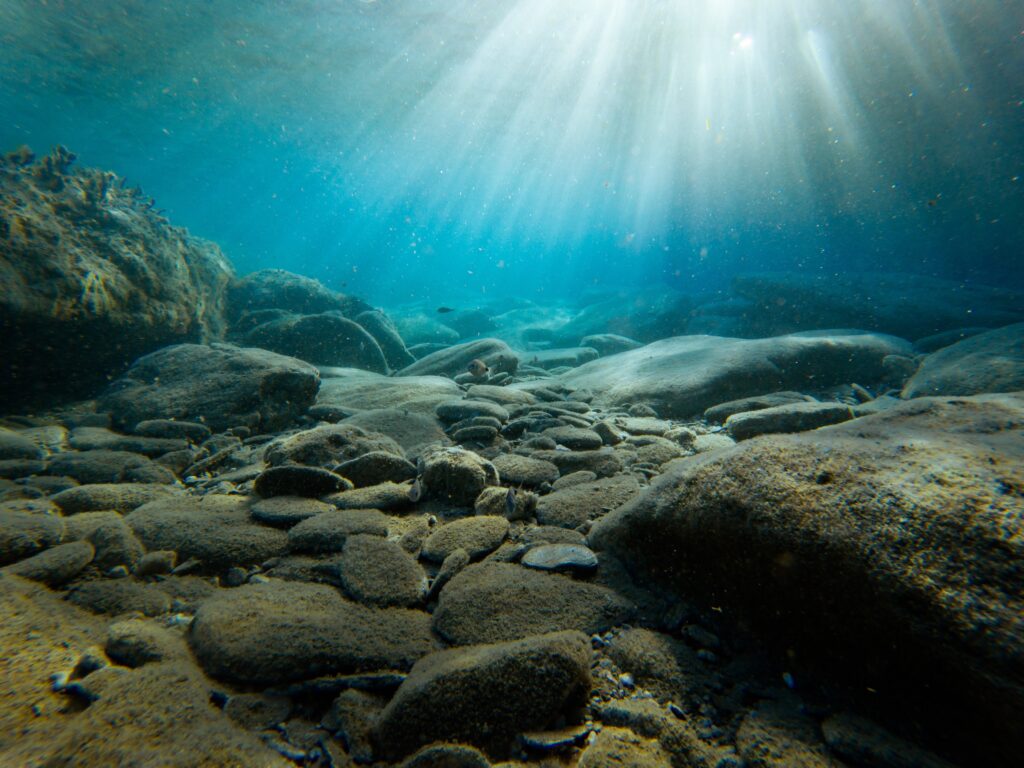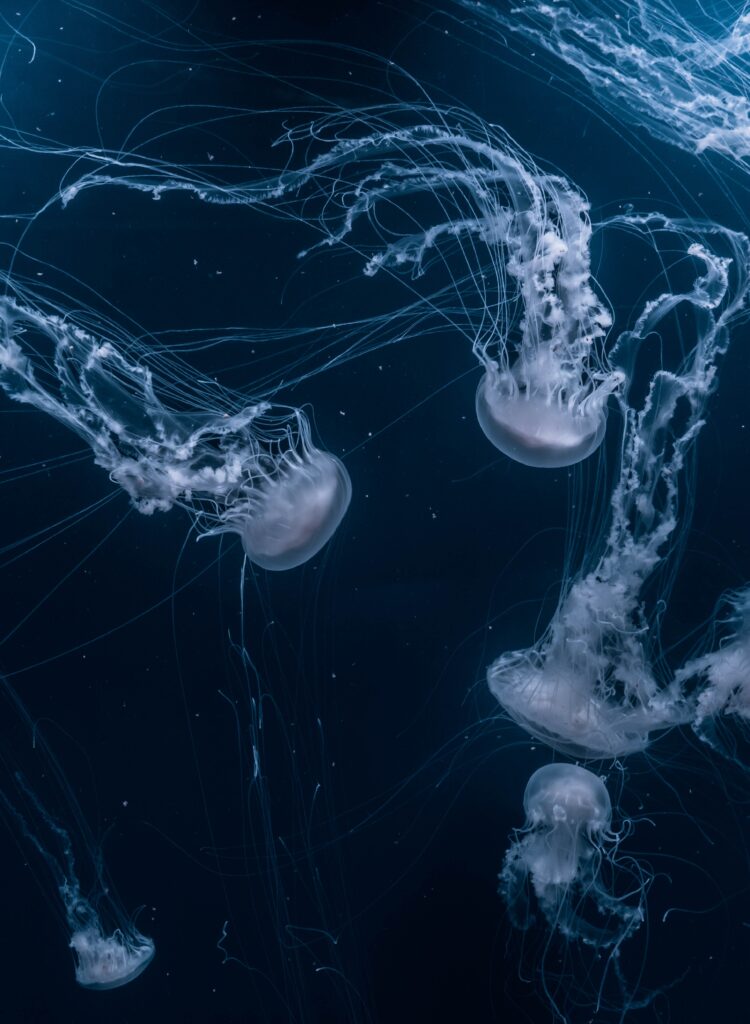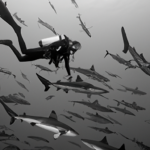Picture this: you’re out on a diving expedition, exploring the depths of the ocean, when suddenly, you spot a majestic shark swimming gracefully nearby. But wait, what’s this? Instead of swimming away in fear, the diver starts pushing the shark? It may sound bizarre, but this unusual behavior has sparked curiosity among divers and researchers alike. In this article, we’ll delve into the intriguing world of divers pushing sharks, exploring the reasons behind this puzzling phenomenon and its potential impact on both the divers and the sharks themselves.
Overview
Divers pushing sharks is a phenomenon that has gained attention and sparked controversy in recent years. This practice involves divers intentionally approaching and physically pushing sharks. While some people perceive this behavior as harmless or even exciting, it raises concerns about the welfare of sharks and the impact on their natural behavior. In this article, we will explore the reasons behind divers pushing sharks, understand shark behavior and the potential motivations for such actions, examine the consequences for sharks and the diving industry, and discuss the importance of education, awareness, and responsible diving practices. Additionally, we will delve into the existing regulations and guidelines, the challenges of enforcement and compliance, and the efforts made for shark conservation.
The Phenomenon of Divers Pushing Sharks
The Controversial Practice
Divers pushing sharks is a highly controversial practice within the diving community and marine conservation circles. While diving enthusiasts aim to explore and appreciate the wonders of the underwater world, the act of physically engaging with sharks has raised ethical concerns. Proponents argue that pushing sharks is an adrenaline-fueled activity that adds excitement to the diving experience, while opponents argue that it is a form of harassment that can harm the sharks and disrupt their natural behavior.
Instances of Divers Pushing Sharks
Instances of divers pushing sharks have been documented in various diving destinations around the world. Some divers are drawn to this behavior because they believe it offers them a chance to interact closely with these magnificent creatures. However, it is essential to recognize that every shark encounter should prioritize the well-being and safety of both the diver and the shark.
Reasons behind Divers Pushing Sharks
Understanding the reasons behind divers pushing sharks requires delving into the motivations and misconceptions that may drive such behavior. Some common factors include ignorance or lack of understanding about shark behavior, thrill-seeking and risk-taking behavior, misguided attempts at self-defense, misconceptions about shark behavior, desire for social media fame, and influences from media and pop culture.

Understanding Shark Behavior
Shark Species and Characteristics
Sharks are incredibly diverse and fascinating creatures, with over 500 different species found worldwide. They play a crucial role in marine ecosystems, helping maintain a balance within the food chain. Understanding the specific behavior and characteristics of different shark species is essential when considering interactions with them. For example, some species are known to be more docile and less likely to display aggressive behavior, while others may exhibit territorial or curious tendencies.
Threat Perception and Defensive Behavior
Sharks have developed a variety of defense mechanisms and behaviors over millions of years of evolution. Like any living organism, they perceive potential threats and respond accordingly. Divers need to understand that their actions can be perceived as threatening, triggering defensive behavior in sharks. Approaching sharks in a calm and non-threatening manner, while maintaining a respectful distance, is crucial to promote a positive interaction.
Provoking a Shark’s Natural Instincts
Pushing sharks can provoke their natural instincts and disrupt their normal behavior patterns. Sharks are powerful marine predators, and they rely on specific instincts for survival and successful hunting. By pushing sharks, divers may inadvertently trigger defensive or aggressive responses, leading to potentially dangerous situations. It is essential to remember that sharks are not pets or playthings, but wild animals deserving of respect and consideration.
Potential Motivations for Divers to Push Sharks
Ignorance or Lack of Understanding
One reason for divers pushing sharks may stem from ignorance or a lack of understanding about shark behavior. Some divers may not be aware of the potential harm their actions can inflict on these animals or the importance of respecting their natural habitat. Education and awareness programs become crucial in dispelling myths and spreading accurate information about sharks to prevent misguided interactions.
Thrill-seeking and Risk-taking Behavior
Diving with sharks is often associated with adventure and thrill-seeking. The excitement and adrenaline rush of being in close proximity to a powerful, apex predator can be tempting for some divers, leading them to engage in risky behaviors such as pushing sharks. However, it is essential to prioritize responsible diving practices and prioritize the well-being of both the diver and the shark.
Misguided Attempts at Self-defense
In some cases, divers may push sharks as a misguided attempt at self-defense. Shark attacks on humans are rare, but media coverage and sensationalism often exaggerate the risks, fueling misconceptions and fears. Divers may believe pushing sharks away will keep them safe, failing to realize that such actions can escalate the situation and potentially provoke an aggressive response from the shark.
Misconceptions about Shark Behavior
Misconceptions about shark behavior are prevalent, perpetuated by media sensationalism and pop culture. Movies and documentaries often depict sharks as bloodthirsty killers, leading to public misconceptions and irrational fears. Divers may push sharks believing they are defending themselves from a perceived threat when, in reality, sharks are generally uninterested in humans and prefer to avoid contact.
Desire for Social Media Fame
In the age of social media, the desire for recognition and fame can drive divers to perform daring and attention-grabbing acts, including pushing sharks. Capturing an exciting encounter with a shark on camera and sharing it online can generate likes, shares, and followers, but it also perpetuates irresponsible behavior. It is crucial to promote responsible diving practices and remind divers that the well-being of marine life should never be compromised for personal gain.
Influences from Media and Pop Culture
The media and pop culture play a significant role in shaping public perceptions and behaviors. The portrayal of sharks as dangerous and fearsome creatures in movies like “Jaws” and sensationalized news coverage contributes to misconceptions about shark behavior. Divers who push sharks may be influenced by these portrayals, believing their actions are justified or exciting. It is vital to promote accurate information through media outlets to counteract these harmful influences.

Consequences for Sharks
Injuries or Stress to the Shark
Pushing sharks can lead to physical injuries or stress on the animals. Sharks have sensitive skin, and forceful interactions can cause abrasions, scratches, or lacerations. Additionally, pushing sharks disrupts their natural swimming movements and can cause unnecessary stress, potentially hindering their feeding, mating, and overall well-being.
Alteration of Natural Behavior
Divers pushing sharks can disrupt the natural behavior patterns of these animals. Sharks may become defensive, agitated, or frightened, altering their typical swimming, hunting, or feeding behaviors. These alterations in behavior can have significant consequences for the overall health and population dynamics of shark species.
Impact on Shark Conservation Efforts
The conservation of sharks is of utmost importance due to their critical role in maintaining marine ecosystems. By pushing sharks, divers undermine conservation efforts and perpetuate harmful stereotypes, making it harder to promote understanding and preservation. Creating a positive environment for both sharks and humans is crucial in fostering support for conservation initiatives and protecting these vulnerable species.
Impact on Divers and the Diving Industry
Public Perception and Image of Divers
The actions of a few divers who push sharks can have a detrimental impact on the public perception of the entire diving community. It is crucial to promote responsible diving practices and distance the sport from activities that harm marine life. By portraying divers as respectful stewards of the ocean, the reputation of the diving industry can be preserved, fostering a positive image and attracting more people to explore and appreciate the underwater world.
Ethical and Environmental Responsibility
Divers have a moral and environmental responsibility to act as stewards of the ocean and protect its inhabitants. Pushing sharks contradicts the principles of ethical diving and harms the very organisms that divers seek to admire. It is imperative to prioritize responsible behavior that reflects a deep respect for marine life and contributes to the conservation of our oceans.
Role of Dive Centers and Instructors
Dive centers and instructors play a vital role in shaping the practices and behaviors of divers. By promoting education, awareness, and responsible diving practices, they can instill a deep respect for marine life and minimize harmful interactions with sharks. Dive centers and instructors should prioritize providing accurate information about shark behavior, emphasizing the importance of conservation, and discouraging activities such as pushing sharks.

Education, Awareness, and Responsible Diving Practices
Importance of Education and Awareness
Education and awareness are crucial in combating the phenomenon of divers pushing sharks. Providing divers with accurate and comprehensive information about shark behavior, conservation, and responsible diving practices can dispel misconceptions and promote positive interactions with these magnificent creatures. By increasing knowledge and understanding, divers can develop a deep appreciation for the importance of respecting and protecting sharks.
Promoting Responsible Diving Practices
Promoting responsible diving practices is essential to safeguard the well-being of sharks and ensure the sustainability of the diving industry. Divers should be educated about the negative impacts of pushing sharks and encouraged to maintain a respectful distance during encounters. Proper training should emphasize the importance of observing sharks non-invasively, minimizing disturbances, and respecting their natural behavior.
Encouraging Conservation and Respect for Marine Life
Diving provides a unique opportunity to witness the beauty and diversity of marine life firsthand. By encouraging divers to develop a genuine respect and appreciation for sharks and other marine creatures, we can foster a sense of responsibility to protect the underwater world. Conservation efforts can be further supported through eco-tourism initiatives that promote sustainable practices and contribute to the preservation of shark habitats.
Regulations and Guidelines
Existing Regulations and Guidelines
Various regulations and guidelines exist to protect sharks and promote responsible diving practices. Many countries and diving organizations have implemented codes of conduct that outline the proper behavior expected from divers when encountering sharks. These regulations emphasize maintaining a safe distance, minimizing disturbances, and avoiding physical interactions with marine life.
Enforcement and Compliance Challenges
Despite the existence of regulations and guidelines, enforcement and compliance present challenges. Monitoring divers’ behavior underwater is challenging, and instances of non-compliance can often go unnoticed. Strengthening enforcement mechanisms and increasing penalties for violations can serve as deterrents and foster a greater sense of accountability among divers.
Need for Strengthening Regulations
As the popularity of diving continues to grow, it is crucial to strengthen regulations to protect sharks and their habitats. Stricter guidelines and clear consequences for non-compliance can help discourage divers from pushing sharks and promote responsible diving practices. Collaboration among diving organizations, conservationists, and government agencies is vital in developing and implementing effective regulations that ensure the well-being of sharks.

Efforts for Shark Conservation
Conservation Organizations and Initiatives
Numerous organizations are dedicated to shark conservation, conducting research, advocating for policy changes, and promoting public awareness and education. These organizations work tirelessly to protect shark populations, dispel myths, and promote sustainable practices. Supporting and getting involved with these conservation initiatives can contribute to the long-term survival of sharks.
Promoting Shark Conservation through Education
Education plays a significant role in promoting shark conservation. Many organizations conduct educational campaigns, create informative resources, and engage with communities to spread awareness about the importance of sharks and debunk myths. By fostering empathy and understanding towards these fascinating creatures, we can encourage individuals to become advocates for shark conservation.
Role of Research and Scientific Studies
Research and scientific studies are essential in furthering our understanding of sharks and their behaviors. This knowledge is critical for developing effective conservation strategies and enhancing public awareness. Researchers study various aspects of shark behavior, population dynamics, and the ecological role sharks play in marine ecosystems. By supporting scientific endeavors, we can contribute to a greater understanding of sharks and their conservation needs.
Conclusion
The phenomenon of divers pushing sharks raises significant ethical concerns and highlights the need for responsible diving practices and increased shark conservation efforts. By understanding shark behavior and the potential motivations behind divers’ actions, we can better address the issue and promote a positive coexistence between humans and sharks. Education, awareness, and strong regulations are essential in safeguarding the well-being of sharks and preserving their critical role in marine ecosystems. By fostering a deep respect for these magnificent creatures, we can ensure their survival and continue to enjoy the beauty of the underwater world for generations to come.

- Can You Dive With Sharks In California? - August 19, 2024
- What Are The Rules Of Shark Cage Diving? - August 19, 2024
- Where In Florida Can You Dive With Sharks? - August 19, 2024








